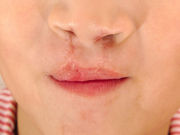Role of pediatrician includes diagnosis and referral, ongoing care, acting as liaison to specialist team
TUESDAY, April 25, 2017 (HealthDay News) — For children with cleft lip and/or cleft palate (CL/P), the primary care pediatrician has an important role, according to a clinical report published online April 24 in Pediatrics.
Charlotte W. Lewis, M.D., M.P.H., from the University of Washington and Seattle Children’s Hospital, and colleagues discussed pediatric care of children with CL/P. Children with CL/P are classified in three groups: cleft lip, cleft lip with cleft palate, and cleft palate alone.
The authors note that CL/P may be associated with one of several syndromes that complicate a child’s needs. Patient care spans from prenatal diagnosis into adulthood. For optimizing outcomes, the appropriate timing and order of specific cleft-related care are important factors; care should be individualized to address the specific needs of patients and their families. To promote successful outcomes, children with CL/P should receive specialty cleft-related care from a multidisciplinary cleft or craniofacial team with adequate patient and surgical volume. The primary care pediatrician from the child’s medical home plays an important role in diagnosis and referral, provision of ongoing care, anticipatory guidance, and acute care, as well as acting as a patient advocate and a liaison between the family and specialty team.
“This document provides background on CL/P and multidisciplinary team care, information about typical timing and order of cleft-related care, and recommendations for cleft/craniofacial teams and primary care pediatricians in the care of children with CL/P,” the authors write.
Copyright © 2017 HealthDay. All rights reserved.








